The College Park City Council discussed strategies to increase voter turnout and increase accessibility for the 2025 city elections at a meeting Tuesday.
Less than 10 percent of registered voters in College Park are participating in local elections, according to city documents. Some initiatives the council considered to solve this issue include ranked choice voting, lowering the voting age to 16 and expanded voting by mail.
Some cities in Prince George’s County, such as Hyattsville and Greenbelt, have adopted a lower voting age. The council previously voted 5 to 3 in favor of the change and agreed to revisit the proposal at a future meeting, the documents said.
District 3 council member John Rigg expressed his support for the lower voting age. He said his teenage son’s interest in politics has shown him that teenagers are capable of making informed decisions about their electoral choice.
“He’s not focused on policy and politics … but he takes it very seriously,” Rigg said. “He’s been diving into the Senate race here in Maryland.”
[New sports apparel store to receive grant from College Park]
Susan Huemmrich, the chair of the Board of Election Supervisors, agreed with Rigg and said the sooner the board can get young people involved in the process, the better.
“People of that age lack experience but they don’t lack sensitivity,” Huemmrich told the council on Tuesday. “They don’t lack compassion and they don’t lack a hunger for a better world.”
If 16 and 17-year-old residents were interested in voting and the council implemented this strategy, they would need to be U.S. citizens with a valid driver’s license registered in Maryland to vote, according to College Park Mayor Fazlul Kabir.
Voting by mail would mean automatically mailed ballots to registered voters weeks ahead of election day in addition to an in-person voting, according to city documents. This tactic increases voter turnout, doesn’t introduce partisan effects, can be used by diverse voter groups and has lower cost per vote, the documents said.
This strategy was implemented during the COVID-19 pandemic and had positive outcomes, Huemmrich said. The election supervisors board also predicts this method would increase voter turnout by 20 percent.
Through ranked choice voting, multiple candidates run for a single seat and are ranked by voters in order of preference, the documents said. This strategy would be the least impactful because of the historically low number of candidates who have run in College Park elections, according to the documents.
[New UMD student liaisons hope to bolster ESL programs, student engagement]
The election supervisors board recommended the council not implement this method, the city documents said.
District 1 council member Jacob Hernandez said this tactic creates a “hurdle” he feels uncomfortable imposing on voters. The other council members agreed that this strategy would not be ideal for College Park elections.
District 2 council member Susan Whitney highlighted the need to expand election advertisements beyond written media in an effort to reach and educate more people — especially if any of the new strategies are implemented.
This method would also allow election information to be understood by more people who speak different languages, Whitney said.
The council will continue their discussion at a future meeting before voting.
District 3 council member Stuart Adams said it would be best to hear feedback from residents about each voting strategy before finalizing their vote.



